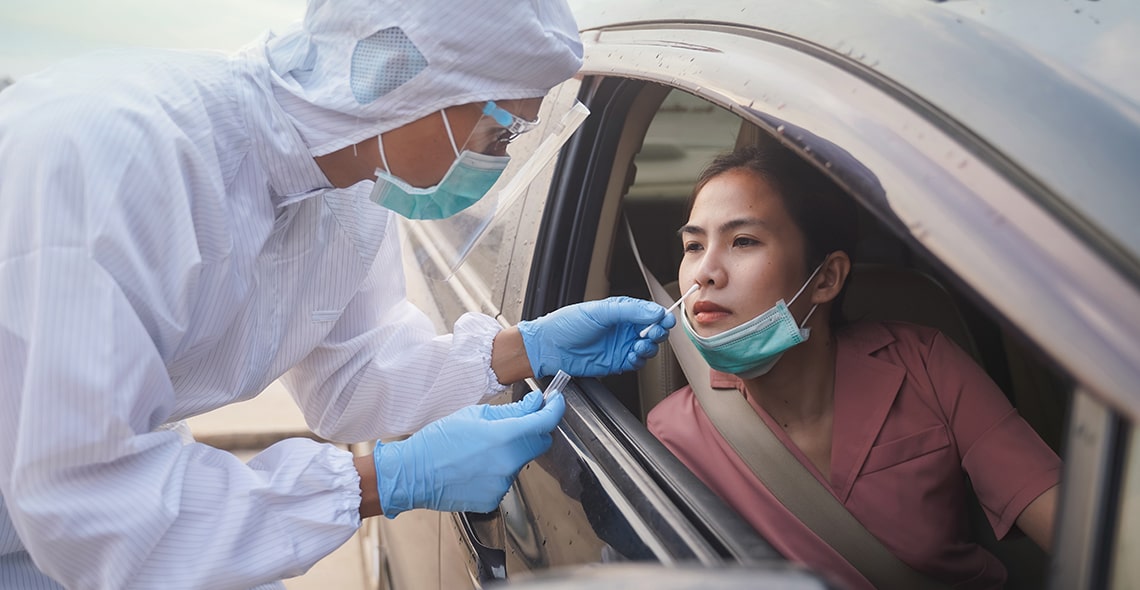What are the different types of COVID-19 tests?

What Are the Different Types of COVID-19 Tests?
As our nation has worked to respond to the COVID-19 pandemic, we’ve discovered a lot of new information and prevention guidelines along the way. That said, one detail has remained consistent: COVID-19 testing can go a long way in slowing the spread. Even new strains have made their way into the U.S., testing, social distancing, wearing a mask and washing your hands continue to be the most effective guards against Coronavirus.
Understandably, because it can be confusing to know the different types of COVID-19 tests that became available in such a short period of time, many people are still unsure about which COVID-19 test is best for a particular situation. So, we’re sharing a quick introduction to the types of tests out there currently, as well as when you should get tested for Coronavirus.
Understanding the two types of COVID-19 tests
Most, if not all, places that promote COVID-19 tests offer diagnostic tests, which screen for an active infection.
In addition, some facilities offer antibody tests, which can identify if you’ve had a past COVID-19 infection. It’s important to note that it’s currently unknown whether the presence of antibodies means a person has immunity to COVID-19 in the future.
Diagnostic testing
Diagnostic tests check for an active infection with COVID-19. Under the umbrella of diagnostic testing, there are two types of tests:
A molecular test looks for the virus’ genetic material with high levels of accuracy.
An antigen test looks for specific proteins on the surface of the virus. While these tests provide quicker results, they also have a higher chance of producing a false negative. In this case, the test could fail to detect an active COVID-19 infection. If you have a negative antigen test, but you’re displaying symptoms associated with COVID-19, your healthcare provider may recommend a molecular test as an extra precaution.
Getting a diagnostic test
Both testing types, the molecular tests, and the antigen tests, are performed the same: You or your healthcare provider will use a special swab to collect mucus from your nose or throat. Alternatively, you may be asked to spit saliva into a special tube. The sample will then be sent to a lab or clinic for analysis.
How long does it take to get results?
Sometimes, patients can receive results the same day that they’re tested. At Avail Hospital, for example, we offer same-day results on PCR COVID-19 testing. Often, however, results from testing sites take up to a week depending on the type of test, lab, and resources available.
Is there anything else I should know about testing?
There are a few diagnostic tests that provide alternative methods or additional benefits.
Some clinics and doctor’s offices offer rapid tests, also referred to as point-of-care Coronavirus tests. At these sites, samples are analyzed onsite, and results may be available within minutes however results are not as accurate as with a PCR molecular test.
For those looking to test at home, at-home collection tests give you the ability to send a sample directly to the lab. In some cases, you’re even able to get your reading at home – but those tests are typically only available with a prescription from your healthcare provider.
True to their name, combination tests look for a variety of respiratory viruses in addition to COVID-19, including the flu and strep throat. The specific viruses the test looks for differs, depending on the type of test.
Getting an antibody test
The antibody test is administered as a blood test to check for antibodies or immunoglobulins, or proteins specific to a particular illness. Antibodies are known to target and destroy new infections, providing immunity or protection against the same illness. In the case of a COVID-19 antibody test, the screening would search for antibodies to SARS-CoV-2, which causes COVID-19.
A positive result could mean that you have antibodies from a past infection with COVID-19 or an infection with a different virus from the Coronavirus family. The antibodies could offer full or partial protection from getting the virus again, but the extent of protection and length of time aren’t known.
A negative result could mean you’ve never had COVID-19, or it might mean the illness was present so long ago, that antibodies in your body decreased to untraceable levels. It could also signal an active COVID-19 infection, as it takes antibodies one to three weeks to develop after an infection. For some people, it takes even longer to develop antibodies, while others never develop antibodies following an infection.
Following your test results, it’s always best to have a conversation with your healthcare provider. They can advise you on your best course of action, which may include isolating at home if you have symptoms.
Should I get a COVID-19 test?
At this time, the Centers for Disease Control and Prevention (CDC) recommends you get tested for COVID-19 if:
- You’re showing symptoms of COVID-19
- You’ve been within six feet for 15 minutes or more of someone who’s tested positive for COVID-19
- You’ve been referred by your healthcare provider or local or state health department
After getting tested for COVID-19, it’s important to isolate at home until you receive your results.
For all your emergency needs, visit AvailHospitals.com.
